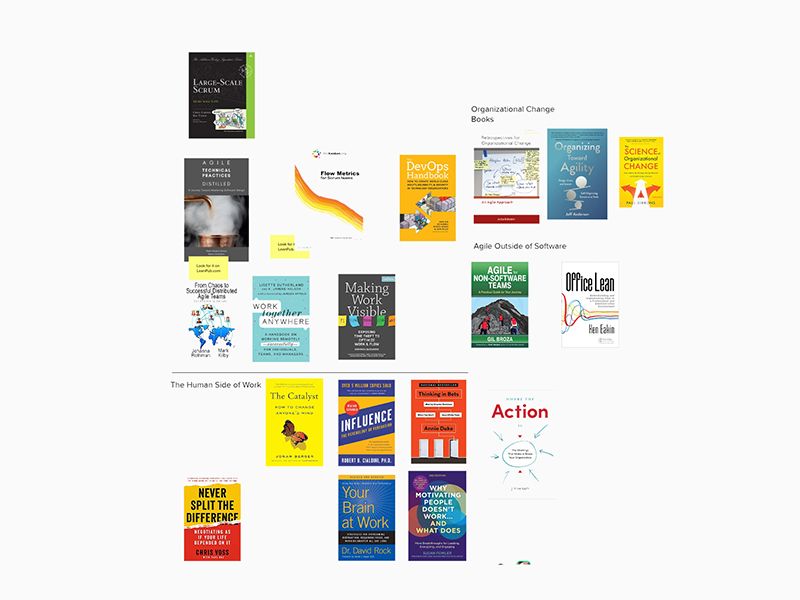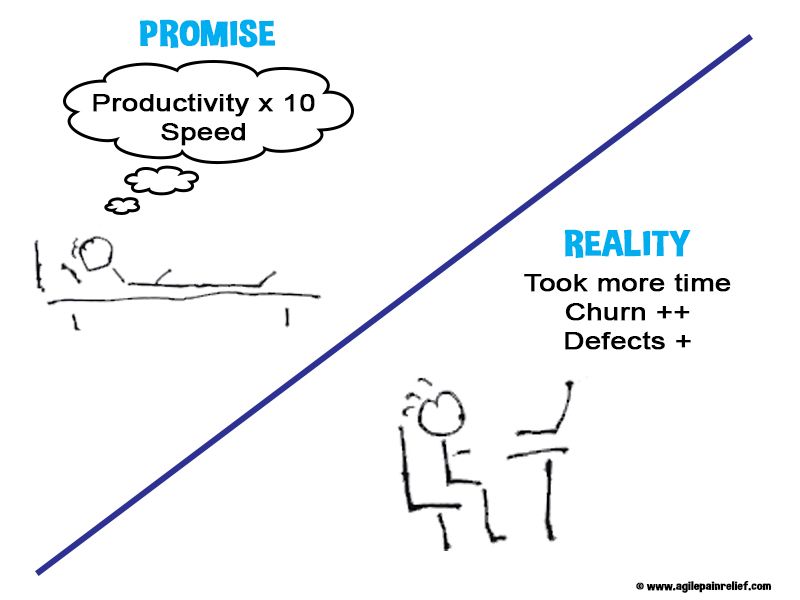Recommended Books for Scrum Masters
For many years I’ve shared with my Certified ScrumMaster workshop attendees a list of recommended reading, updated when I find new gems. My hypothesis is that a good ScrumMaster knows that a short workshop can’t cover everything and they will be hungry for more reading. Here are my suggestions.
(Disclaimer: Some of these are affiliate links because a marketing guru said I should have them. It doesn’t cost you anything more and I might earn enough in a year for a cup of coffee.)

Core
Large-Scale Scrum: More with LeSS by Craig Larman and Bas Vodde - LeSS is appealing because it is the lowest overhead approach to organizing multiple teams that I’m aware of. In addition, LeSS was derived through practice. Instead of creating a theory, they tried stuff that worked.
Agile Technical Practices Distilled by Pedro Moreira Santos, Marco Consolaro, and Alessandro Di Gioia - Excellent summary of all of the TDD, BDD, Refactoring, Pair Programming.
Flow Metrics for Scrum Teams by Daniel Vacanti and Will Seele - Vacanti is one of the best people for understanding what measurements help teams improve, and Dan is humane in his application of Kanban/Scrum.
Agile Retrospectives, Second Edition by Esther Derby, Diana Larsen, David Horowitz - The original book on Agile Retrospectives got a rewrite after 20 years.
Making Work Visible: Exposing Time Theft to Optimize Work & Flow by Dominica DeGrandis - A series of exercises that introduce the ideas of Kanban without the dogma.
The DevOps Handbook by Gene Kim, Jez Humble, Patrick Debois, John Willis, Nicole Forsgren - The only good technical book I know of on DevOps.
Remote work and Distributed Teams
From Chaos to Successful Distributed Agile Teams by Johanna Rothman and Mark Kilby - Mark has been coaching distributed teams for a long time before it became popular in the pandemic.
Work Together Anywhere by Lisette Sutherland - Focused on being an individual contributor in a remote team. Written pre-pandemic, it deals surprisingly well with the hybrid problems we face today. Caveat: hybrid/remote work is continues to change and evolve.
Organizational Change
Retrospectives for Organizational Change: An Agile Approach by Jutta Eckstein - Org change is hard, but using retrospectives to guide the process makes it less painful.
Organizing Toward Agility: Design, Grow, and Sustain Self-Organizing Structure at Scale by Jeff Anderson - Shows how Agile organizations could be structured and evolve. It is chock full of options and tradeoffs, as opposed to a formulaic approach.
The Science of Organizational Change by Paul Gibbons - Examines how organizational change works. Brings a scientific perspective, including material on motivation and where resistance comes from.
Agile Outside of Software
Agile for Non-Software Teams by Gil Broza - Takes Agile back to first principles and helps you build out your own Agile implementation.
Office Lean: Understanding and Implementing Flow in a Professional and Administrative Environment by Ken Eakin - Eakin hardly mentions Agile at all; instead he takes an approach very much inspired by Toyota Lean Production System and applies it to professional work.
The Human Side of Work
Why Motivating People Doesn’t Work…and What Does, Second Edition: More Breakthroughs for Leading, Energizing, and Engaging by Susan Fowler - The classic book on understanding human motivation (hint: it’s not carrot and stick.) This book introduces the ARC Model.
Your Brain at Work, Revised and Updated by David Rock - Covers how our brains do and don’t work during the working day. It’s a well-written book, marred only because the science has moved on in at least one area (willpower) and the 2020 edition of the book still relies on the invalidated work of Roy Baumeister.
The Catalyst by Jonah Berger - Cialdini (below) remains the most authoritative book on influence, however Berger has written the easiest read. Start here and then go deep with Cialdini.
Influence, New and Expanded: The Psychology of Persuasion by Robert Cialdini - As a ScrumMaster and agilist, you need to use influence on a daily basis. You want the team to consider an experiment or an idea? You use influence. You want management to resolve an organizational impediment? That will require more influence. Cialdini shows you how influence works, and outside of work he shows you how companies like Amazon influence you every day.
Never Split the Difference: Negotiating As If Your Life Depended On It by Chris Voss and Tahl Raz - As ScrumMasters you have no formal power and authority. Along with influence, you will spend a great deal of time negotiating. Negotiation, contrary to popular belief, isn’t about agreeing on facts and finding a win-win. Real negotiation involves understanding the other party’s emotional needs. Until their needs are met, you can’t reach an agreement.
Thinking in Bets: Making Smarter Decisions When You Don’t Have All the Facts by Annie Duke - Teaches us how poker players make decisions under conditions of uncertainty, starting with the simplest idea: fielding errors. When I play a hand and win, that doesn’t necessarily mean I had good strategy. Maybe I was just lucky. When I lose a hand, that isn’t always bad luck, maybe I had a poor strategy.
Where the Action Is: The Meetings That Make or Break Your Organization by J. Elise Keith - Shows that there are 16 different kinds of meetings and they all need to be handled differently.
Remember
Think I missed an important book? If you’re part of our community, post your suggestion HERE.

Mark Levison
Mark Levison has been helping Scrum teams and organizations with Agile, Scrum and Kanban style approaches since 2001. From certified scrum master training to custom Agile courses, he has helped well over 8,000 individuals, earning him respect and top rated reviews as one of the pioneers within the industry, as well as a raft of certifications from the ScrumAlliance. Mark has been a speaker at various Agile Conferences for more than 20 years, and is a published Scrum author with eBooks as well as articles on InfoQ.com, ScrumAlliance.org and AgileAlliance.org.
